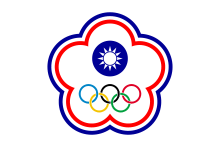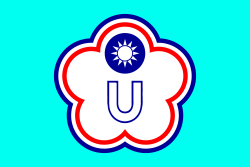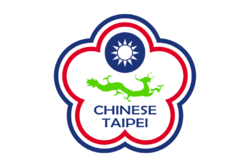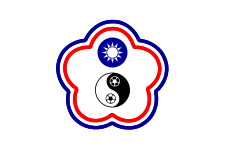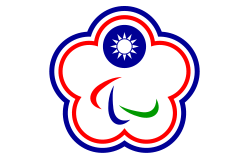- Chinese Taipei
-
Chinese Taipei Traditional Chinese 中華臺北 or 中華台北 Simplified Chinese 中华台北 Transcriptions Mandarin - Hanyu Pinyin Zhōnghuá Táiběi - Wade–Giles Chunghua T'aipei Min - Hokkien POJ Tiong-hôa Tâi-pak Chinese Taipei is the designated name used by the Republic of China (ROC), commonly known as Taiwan, to participate in some international organizations and almost all sporting events, such as the Olympics, Paralympics, Asian Games and Asian Para Games. The international community commonly employs the term "Chinese Taipei" due to political pressure by the People's Republic of China (PRC), commonly known as China, which prefers the name as it creates ambiguity about the independence and political status of Taiwan, blocks international visibility of the "Republic of China" as a country, and implies that ROC is part of the same "China" under PRC's control. It is seen as an important tool to influence international perception of cross-strait relations and Taiwan's political status as a sovereign state.
Contents
Origins
After the Republic of China (ROC) lost its United Nations seat in 1971, more and more countries terminated their diplomatic relations with Taipei and established new ties with Beijing, the People's Republic of China (PRC). In diplomatic circles, Beijing was on the rise and the ROC found that in order to participate in some international forums it would have to make difficult concessions towards the PRC. One of these concessions was acceptance of the term "Chinese Taipei" as a name. The first instance that this name was used in a major international organisation was in the International Olympic Committee (IOC). By 1979, the IOC had finally decided that the Beijing Olympic Committee would be the "Chinese Olympic Committee" and another name would need to be found for the Olympic Committee on Taiwan.
In April 1979, in a plenary session of the IOC, He Zhenliang, a representative of the PRC, stated:
According to the Olympic Charter, only one Chinese Olympic Committee should be recognized. In consideration of the athletes in Taiwan having an opportunity to compete in the Olympic Games, the sports constitution in Taiwan could function as a local organization of China and still remain in the Olympic Movement in the name of the Chinese Taipei Olympic Committee. However, its anthem, flag and constitutions should be changed correspondingly.[1]
In November 1979, in Nagoya, Japan, the International Olympic Committee, and later all other international sports federations, adopted a resolution under which the National Olympic Committee of the ROC would be recognized as the Chinese Taipei Olympic Committee, and its athletes would compete under the name Chinese Taipei.[2][3] The National Olympic Committee of the ROC boycotted the 1980 Olympics (both the winter and summer games) in protest of this resolution.[4]
The Chinese nationalism asserted by the top leadership of the ROC government during the 1970s meant that a name such as "Taiwan" would be unacceptable to them.[5] The ROC leadership insisted that there be some kind of “Chinese-ness” to the name under which the island's team competed.
The ROC government turned down chances to use the name "Taiwan" (for example, at the 1976 Montreal Olympics), although the team had previously marched as "Taiwan" in opening ceremonies (for example, in Tokyo).[5] One repeated contention recorded in the ministry reports is that both parts of divided China are Chinese territories and the people in one part are no less Chinese than those in the other. Another argument holds that the jurisdiction of the ROC Olympic Committee (ROCOC) includes Penghu, Kinmen and Matsu in addition to Taiwan, and thus the name “Taiwan” does not reflect the “territorial extent” of the ROCOC. Furthermore, although it is true that most products from the ROC are labeled “made in Taiwan,” the trade practices of the ROC are such that the regional area of production is used for labeling. Some wines from Kinmen are labeled “made in Kinmen,” just as some perfume is labeled “made in Paris” and not “made in France.” Finally, it was argued that the people of the ROC were Chinese and not “Taiwanese,” so the word Taiwan was not appropriate.
The ROC government under the Kuomintang (KMT) rejected designation as "Taiwan, China" on grounds that this would imply subordination to the People's Republic of China.[5] It also refused the names "Taiwan" and "Formosa (simplified Chinese: 福尔摩沙; traditional Chinese: 福爾摩沙)" as a means of reasserting both its claim as the sole legitimate government of all of China, and its uncompromising rejection of Taiwan independence. Instead, deriving from the name of its capital city, the ROC government finally formulated the name “Chinese Taipei,” instead of accepting the offer of “Taiwan,” because “Chinese Taipei” signified an uncertain boundary that could exceed the ROC’s actual territory of control of Taiwan, Penghu, Kinmen and Matsu, whenever the ROC government wished to assert it. It regarded the term Chinese Taipei as both acceptably neutral and hopeful of assent from other interested parties. Its proposal found agreement. Beijing accepted the compromise position that the ROC Olympic Committee could be named the "Chinese Taipei Olympic Committee".
The name "Chinese Taipei" was formally accepted by the Taipei government in 1981.[6][7] A flag bearing the emblem of its Olympic Committee against a white background as the Chinese Taipei Olympic flag was confirmed in January 1981.[2] The agreement was signed on March 23 in Lausanne by Shen Chia-ming, the President of Chinese Taipei Olympic Committee, and Juan Antonio Samaranch, the President of the IOC. In 1983, National Flag Anthem was chosen as the anthem of the Chinese Taipei delegation. The Republic of China has competed under this flag and name exclusively at each Games since the 1984 Winter Olympics, as well as at the Paralympics and at other international events.
Translation compromise
Both sides agree to use the English name "Chinese Taipei". This is possible because of the ambiguity of the English word "Chinese", which may mean either the state or the culture. In 1979, the International Olympic Committee passed a resolution in Nagoya, Japan, restoring the rights of the Chinese Olympic Committee within the IOC, meanwhile renaming the Taipei-based Olympic Committee "Chinese Taipei Olympic Committee". Since then, and until 1989 the PRC translated "Chinese Taipei" as "Zhongguo Taipei" (simplified chinese: 中国台北, traditional chinese: 中國臺北, hanyu pinyin: Zhōngguó Táiběi), connoting that Taipei is a part of the Chinese state. By contrast, the Republic of China government translated it as "Zhonghua Taipei" (traditional chinese: 中華台北 or 中華臺北, Hanyu Pinyin: Zhōnghuá Táiběi) in Chinese, which references the term "China" as the cultural or ethnic entity, rather than the state. In 1981 the former Republic of China Olympic Committee confirmed its acceptance of the Nagoya resolution, but translated "Chinese Taipei" to "Zhonghua Taipei". In 1989, the two Olympic committees signed a pact in Hong Kong, clearly defining the use of "Zhonghua Taipei".[8] The PRC had been observing the Hong Kong pact and using "Zhonghua Taipei" in stipulated areas ever since, but on other occasions, the version of "Zhongguo Taipei" was still in use following past practice, especially in official media references.[9] In the Olympic Games opening ceremony, when each country's team normally proceeds in alphabetical order in English, the Chinese Taipei (TPE) team does not follow China (CHN), but instead takes a place in the procession as if its name were "Taipei," following countries such as Switzerland and Syria instead. In Beijing 2008 it followed Japan and preceded the Central African Republic.[10] This ordering was based on the stroke number and order of each team's name in simplified Chinese, the official script in the PRC.
Use of the name
The name "Chinese Taipei" has spilled into apolitical arenas. The PRC has successfully pressured some religious organizations and civic organizations to refer to the ROC as "Chinese Taipei".[11] The Lions Club used to refer to the Republic of China as "Chinese Taipei", but it now uses the name "Taiwan MD 300"[12] Both the International Monetary Fund.[13] and the World Bank[14] refer to the Republic of China as "Chinese Taipei", and "Taiwan" does not appear on the member countries list of both organizations. The ICSU also refers to the Republic of China as "China Taipei", right below "China CAST".[15] The Republic of China is a member economy of APEC, and its official name in the organization is "Chinese Taipei".[16] It is also an observer in the World Health Organization (WHO) under the name Chinese Taipei. It is the only agency of the United Nations that the ROC is able to participate in since 1971.
In the Miss World 1998, the government of the People's Republic of China pressured the Miss World Organization to rename Miss Republic of China 1998 to "Miss Chinese Taipei", it has been competing ever since under that designation.[17] The same happened in 2000, but with the Miss Universe Organization. Three years later at the Miss Universe pageant in Panama, the first official Miss China and Miss Taiwan competed alongside each other for the first time in history, prompting the Chinese government to again demand that Miss Taiwan assume the title "Miss Chinese Taipei". The contestant in question, Chen Szu-yu, was famously photographed tearfully holding her two sashes[citation needed]. Today, neither Miss Universe nor Miss World, the two largest pageant contests in the world, allow Taiwan's entrants to compete under the Taiwan label. In 2005, the third largest pageant contest, Miss Earth, initially allowed beauty contestant Li Fan Lin to compete as "Miss Taiwan"; after a week into the pageant, however, her sash was updated to "Taiwan ROC". However, in of 2008, the official name for the ROC, change to for "Chinese Taipei".[18]
The title "Chinese Taipei" leads some people to believe that "Taipei" is a country. During the 2004 Summer Olympics in Athens, NBC television clarified each time the name was used that "Chinese Taipei" referred to Taiwan. Japanese and South Korean televisions were more impatient and simply dropped "Chinese Taipei" altogether in its reports, using "Taiwan" instead.[19] For sporting events, the ROC team is abbreviated in Taiwan as the Zhonghua Team (中華隊; Zhonghua being a more cultural rather than political variation of the term China), which, in effect, labels it the "Chinese Team".
Starting around the time of the 2004 Summer Olympics, there has been a movement in Taiwan to change all media references to the team to the "Taiwanese Team", and the mainstream Taiwan Television (TTV) is one of the first Taiwanese media outlets to do so. Such usage remains relatively rare, however, and other cable TV channels currently refer to the ROC as the Zhonghua Team and the PRC as the Zhongguo Team, the China team or the mainland China team.
In the 2005 International Children's Games in Coventry, United Kingdom as well as the National Geographic World Championship, the name Chinese Taipei was too used. Chinese Taipei was also the term used by Major League Baseball for the ROC teams that participated in the 2006 and 2009 World Baseball Classic competitions, competing under the Chinese Taipei Olympic flag. The Little League World Series also refers to the Taiwanese teams as Chinese Taipei (although the uniforms states Asia-Pacific).
Separate Customs Territory of Taiwan, Penghu, Kinmen, and Matsu
Separate Customs Territory of Taiwan, Penghu, Kinmen, and Matsu Traditional Chinese 臺澎金馬個別關稅領域 Simplified Chinese 台澎金马个别关税领域 Transcriptions Mandarin - Hanyu Pinyin Tái Péng Jīn Mǎ Gèbié Guānshuì Lǐngyù - Wade–Giles T'ai Peng Chin Ma Ke-pieh Kuan-shui Ling-yü Min - Hokkien POJ Tâi-phêⁿKim-bé Kò-piàt Koan-sòe Léng-hèk The World Trade Organization officially uses "Separate Customs Territory of Taiwan, Penghu, Kinmen, and Matsu" [20] for the Republic of China, but "Chinese Taipei" is used very often since the official designation is too unwieldy. It is a politically neutral name; there is not any reference to what it is separated from (presumably, the People's Republic of China). Even official documents within WTO refer to the "separated customs territory..." as "Chinese Taipei".[21]
Other references to the Republic of China
References used in the international context to refer to the Republic of China or Taiwan differ according to the type of the organization.
International organizations that only admit sovereign states generally do not recognise the Republic of China or allow its membership. Presently, the ROC is recognized by 23 states. Thus, for example, whenever the United Nations makes reference to Taiwan, which does not appear on its member countries list[22] it uses the designation "Taiwan, Province of China", and organizations that follow UN standards does the same, such as International Organization for Standardization in its listing of ISO 3166-1 country codes. Certain web-based postal address programs also label the country designation name for Taiwan as "Taiwan, Province of China". Inter-governmental organizations use a variety of terms to designate ROC. Some non-governmental organizations which the PRC does not participate in continue to use "China" or the "Republic of China". The World Organization of the Scout Movement is one of few international organizations that continue to refer to the Republic of China as "China", and the ROC affiliate as the Scouts of China. This is because such Scouting organizations do not exist in the People's Republic of China.
Countries that maintain diplomatic relations with the Republic of China, especially the ROC's older diplomatic affiliates, also refer to the ROC as "China" on occasion; for example, during the funeral of Pope John Paul II, the President of the Republic of China Chen Shui-bian was seated as part of the French alphabetical seating arrangement between Marisa Letícia, the first lady of Brazil, and the president of Cameroon as the head of state of "Chine".
See also
- History of the Republic of China
- Flag of the Republic of China
- Chinese Taipei Olympic flag
- National Banner Song
- Sport in Taiwan
- Political status of Taiwan
- Foreign relations of the Republic of China
References
- ^ Brian B. Pendleton, "The People's Republic of China and the Olympic Movement: A Question of Recognition," Unpublished Doctoral dissertation, The University of Alberta, 1978, p. 115.
- ^ a b Liu, Chin-Ping (2007). "1981年奧會模式簽訂之始末" (in Traditional Chinese) (PDF). http://www.tpa.gov.tw/upfile/www/Pdf/%E8%AB%96%E6%96%87%E9%9B%86/200710/20071025c.pdf. Retrieved 2010-07-08.
- ^ Chao, Li-Yun (2001-11-02). "「中華台北」會籍名稱使用事略" (in Traditional Chinese). National Policy Foundation. http://old.npf.org.tw/PUBLICATION/EC/090/EC-R-090-017.htm. Retrieved 2010-07-08.
- ^ http://www.kiat.net/olympics/history/winter/w13lakeplacid.html Winter Olympic Games Lake Placid, USA, 1980
- ^ a b c Catherine K. Lin (2008-08-05). "How ‘Chinese Taipei’ came about". Taipei Times. http://www.taipeitimes.com/News/editorials/archives/2008/08/05/2003419446.
- ^ However, the name of the committee in Chinese continues to be "中華奧林匹克委員會" ("Chinese Olympic Committee"): see Official Website.
- ^ Joe Hung (2002-01-10). "Chinese Taipei". National Policy Foundation. http://old.npf.org.tw/PUBLICATION/NS/091/NS-C-091-011.htm. Retrieved 2010-07-09.
- ^ "Mainland plea to end Taiwan's name issue". China Daily. 2008-07-24. http://www.chinadaily.com.cn/china/2008-07/24/content_6871657.htm.
- ^ "China clarifies Taiwan Olympics team name issue". New Ind Press. 2008-07-24. http://www.newindpress.com/NewsItems.asp?ID=IEE20080724035229&Page=E&Title=Olympics+2008&Topic=0&.
- ^ "Taiwanese team will compete as 'Chinese Taipei', Beijing confirms". South China Morning Post. 2008-07-24. http://olympics.scmp.com/Article.aspx?id=1508§ion=latestnews.
- ^ "Stilblüten" (in German). http://www.taiwan-info.de/html/deutsch/stilblueten.htm.
- ^ "Lions Club Locator". Lions Clubs International. 2008-11-11. http://www.lionsclubs.org/locator/lions/search_form_country.php.
- ^ "IMF reports and publications arranged by country". International Monetary Fund. 2008-11-11. http://www.imf.org/external/country/index.htm.
- ^ "Member Countries & Regions of the World Bank". The World Bank. 2008-11-11. http://web.worldbank.org/WBSITE/EXTERNAL/COUNTRIES/0,,pagePK:180619~theSitePK:136917,00.html.
- ^ "ICSU National Unions". ICSU. 2008-11-11. http://www.icsu-asia-pacific.org/membership_nationalunions.htm.
- ^ "APEC FAQ: Who are the members of APEC?". Asia Pacific Economic Cooperation. 2008-11-11. http://www.apec.org/apec/tools/faqs.html#Q3.
- ^ "Miss World 2008 Contestants". Miss World. 2008-11-11. http://www.missworld.com/.
- ^ "85 Beauties Set Their Sights on 'Miss Earth 2008' Crown". Oh My News. 2008-11-11. http://english.ohmynews.com/articleview/article_view.asp?at_code=435812&no=384038&rel_no=1.
- ^ "Rest in peace, `Chinese Taipei'". Taipei Times. 2004-09-01. http://www.taipeitimes.com/News/editorials/archives/2004/09/01/2003201149.
- ^ WTO page for "Separate Customs Territory of Taiwan, Penghu, Kinmen, and Matsu"
- ^ "MEMBER INFORMATION: Separate Customs Territory of Taiwan, Penghu, Kinmen and Matsu (Chinese Taipei) and the WTO". World Trade Organization. 2008-11-18. http://www.wto.org/english/theWTO_e/countries_e/chinese_taipei_e.htm.
- ^ "United Nations Infonation". The United Nations. 2008-11-11. http://www.un.org/Pubs/CyberSchoolBus/infonation3/menu/advanced.asp.
External links
- (Chinese (Taiwan)) 國民體育季刊 No. 156. Focus Topic: Olympic Model
- Chinese Taipei Olympic Committee Official Website
- Swiss Residency Permits Refer the Nationality of ROC Citizens as "Chinese Taipei"
Politics of the Republic of China (Taiwan) Doctrines 
Government BranchesExecutive (Premier) · Legislative (Speaker) · Judicial · Control · Examination · Defunct: National AssemblyLeadershipParties OthersElections PresidentialLegislativeNational AssemblyCross-Strait Foreign affairs United Nations · Chinese Taipei · India · Japan · Paraguay · Singapore · South Korea · United States · VenezuelaOther topics StatusPolitical · LegalIssuesCategories:- Articles with Chinese (Taiwan) language external links
- Foreign relations of the Republic of China
Wikimedia Foundation. 2010.

